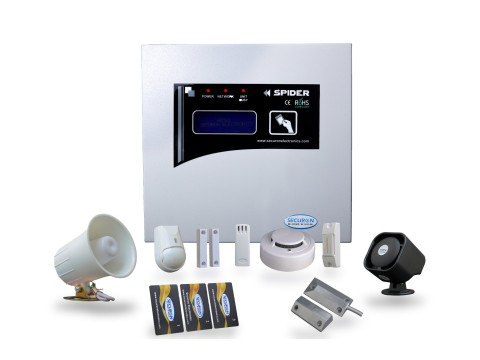Wired Security Systems: Reliable Protection for Homes and Businesses
Wired security systems remain a popular choice for protecting homes, offices, and other properties. Known for their reliability and cost-effectiveness, these systems continue to be an excellent option despite the growing popularity of wireless solutions. Below, we’ll explore the components, benefits, and practical applications of wired security systems.
Components and Benefits of Wired Security Systems
Main Components:
- Control Panel: Central unit managing the system.
- Wired Sensors: Detect movement, window breakage, or door openings.
- Cabling: Connects sensors to the control panel.
Key Advantages:
- Cost-Effective Equipment: Wired systems are generally more affordable than wireless counterparts.
- Reliable Communication: Unaffected by wireless interference or signal loss.
- Consistent Power Supply: Sensors and devices are powered directly via cables.
- Durability: Suitable for long-term installations in various environments.
Drawbacks to Consider:
- Complex Installation: Requires professional expertise for cable routing and setup.
- Aesthetic Impact: Cables may disrupt the design of finished interiors.
Cables and Wiring for Wired Security Systems
Proper cabling is critical for the functionality and durability of wired systems. Here’s what to know:
1. Types of Cables:
- Signal Cables: Transmit data between sensors and the control panel. Common types include 4x0.5mm², 6x0.5mm², and 8x0.5mm² multi-strand cables.
- Power Cables: Deliver electricity to the system, typically requiring a three-core cable (e.g., 0.75mm²).
2. Installation Guidelines:
- Maintain a minimum distance of 0.5 meters between signal cables and power lines to avoid interference.
- Use shielded cables in areas with high electromagnetic interference.
- Protect cables from damage with conduits, cable trays, or armored coverings.
3. Protection Measures:
- Use cable conduits or metallic piping to safeguard against tampering or accidental damage.
- Plan cable routes during construction or renovations to maintain the aesthetics of the space.
Types of Wired Sensors
Wired systems support various sensor types to meet diverse security needs:
Motion Detectors:
- Detect movement within a designated area.
- Types: Infrared (IR), microwave, and dual-technology detectors.
Door and Window Contacts (Magnetic Sensors):
- Monitor the opening and closing of doors or windows.
- Available in surface-mount or recessed designs.
Glass Break Sensors:
- Detect the sound or vibrations caused by breaking glass.
- Types: Acoustic, vibration-based, and combined sensors.
Combination Sensors:
- Incorporate multiple detection methods (e.g., motion + glass break) in one device for added efficiency.
Applications for Homes and Vacation Properties
Why Choose Wired Systems?
Wired security systems are ideal for permanent installations, especially during new construction or major renovations. Here’s why:
- Homes: Offers comprehensive coverage with minimal interference. Best installed during renovation or building phases to conceal cables.
- Vacation Properties: Ensures reliability for seasonal homes where wireless connectivity might be unstable.
Key Installation Tips:
- Plan the Layout: Define the zones to monitor (e.g., doors, windows, hallways).
- Choose the Right Sensors: Match the sensors to the property’s needs and layout.
- Hire Professionals: Proper installation ensures maximum system reliability.
Considerations for Aesthetics:
- For finished interiors, opt for low-profile cables or wireless extensions to preserve the design.
- Cable covers or decorative conduits can help integrate wiring seamlessly.
Conclusion
Wired security systems are a time-tested solution for reliable and affordable property protection. By choosing the right sensors and cables, and ensuring professional installation, you can achieve a robust security setup for your home, vacation property, or commercial space. Visit safsale.com to explore top-rated wired security solutions tailored to your needs.

